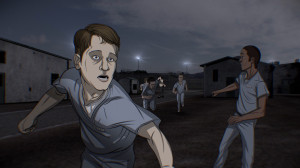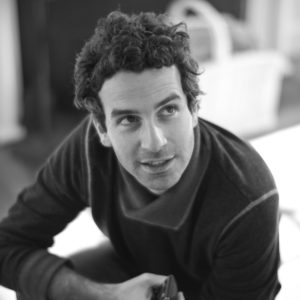GABRIEL LONDON is a documentary filmmaker whose storytelling focuses around major policy issues. He began working on criminal justice issues as an undergraduate at Pomona College, where he won the Albert R. Broccoli film award for a prison documentary, Turned Out. In 2001, he produced and directed No Escape: Prison Rape in America, two short films that accompanied the Human Right Watch Report of the same name, which were honored with a Soros Criminal Justice Award. In 2004, he produced Drew Barrymore’s MTV documentary about youth voting, The Best Place to Start, and produced and directed the video documentary short, Based on a True Story: The Making of ‘Monster.’ For Spike TV in 2008, he directed Snoop Dogg’s autobiographical streets to prison story: Youth Authority: California.
He is a partner, and creative director of Found Object, where he conceives of content and strategy for Corporate Social Responsibility and Non-Government Organization clients seeking to create a public impact.
His films have been broadcast nationally and internationally, and have been featured in festivals including Hotdocs, Tallgrass International Film Festival, Los Angeles Film Festival, Lone Star Film Festival, Starz Denver Film Festival, Naples International Film Festival, Key West Film Festival, DOC NYC, International Documentary Film Festival Amsterdam, Urbanworld Film Festival, and Live Earth.
His latest documentary, The Life and Mind of Mark DeFriest, has won numerous awards at film festivals from best documentary feature to audience favorite.
I interviewed Gabriel at the Naples International Film Festival about his latest documentary, The Life and Mind of Mark DeFriest.
Has anyone ever written about Mark’s story before? It seems familiar to me.
No one has ever put together the pieces of his puzzle. People may have written about his escapes, but no one has ever written about his character.
How did you hear about Mark’s story? 
I heard about it from two different sources. One was the Miami Herald. I was fascinated by this non-violent prisoner who had been held on this super draconian wing of the prison with double doors and solitary confinement 24 hours a day, which had no windows, no magazines, no radio, no TV. They were allowed books, but Mark could get in trouble for property damage to a book, so, for example one time he got 60 more days on X wing because there were pages missing from a Tom Clancy book called Power Plays.
Those were the kind of reasons they were holding him there all those years; they just needed excuses to keep him there, because he was such an escape risk. But there was also a management problem and that comes back to the fact that they never understood the mental health issues in his situation. Mark was infuriating, but they never understood the underlying reasons they could have looked into.
The next day [after reading the Herald article] I found a woman who worked with prisoners, and she told me she had 15 years of letters from an inmate named Mark DeFriest. I said, “Oh my God, is that the guy I just read about in the Miami Herald?” And she said, “Yeah.”
What is the woman’s name?
Her name is Judith Jones. She passed away a number of years ago, but she had written all these letters to him, and vice versa, Mark had written to her really confessing and laying out all the things that had happened to him in prison. Not just confessing, but actually recording it, almost live.
How many years was Mark in solitary confinement? I always felt the film was a wild ride with the audience. I didn’t expect people to be so impassioned about it.
He’s been in 27 years of solitary confinement out of 34 years in prison.
Did you write the film?
Yes. When you do a documentary film, writing generally means building the narrative structure, and creating the underlying approach to it; that’s what that means. It’s the narrative. It’s more like breaking the story for a writer. There’s no voiceover, for example, we have all these old found documents. Then working with my editor, Nick Clark, he’s more focused on the structure of scenes as opposed to the structure of the film.
I understand the movie took 13 years to make. How long did editing take?
Since 2010, so basically three years.
Who partook in that editing process?
The hands on people were me, and Nick, and to some extent my producing partner Charlie Sadoff. We’d get notes from the other producer Daniel Chalfen and the two executive producers Jim Butterworth, and David Menschel.
How did you get it into the film festivals?
We actually submitted it early and heard people say, “That’s such an interesting project, but it’s not done yet.” I kept thinking I was done, but I kept reviving it.
Where did the film debut?
The film debuted in April at HotDocs, which is the International Documentary Flim Festival in Toronto. It’s the biggest documentary film festival in North America. It had its US premier at the Los Angeles Film Fest.
How has the film been received?
The film is being well received beyond my expectations. I always felt the film was a wild ride with the audience. I didn’t expect people to be so impassioned about it.
The step-Mom’s phone call seemed to part of the catalyst to Mark going to prison. Why did the step-mom call the police?
I think there was a family disagreement and they had done everything they could over the years to work with Mark. They tried to get to a good level and she [step-Mom] felt her space was violated. I think she wanted a lesson to be taught. I don’t think she ever expected it to spiral where it did.

How did you come to the decision to tell this story?
I beat my head for years trying to figure out how to tell this story. I slowly assembled the pieces.
The editorial process was so complex. There was a a lot of material to cut from, so we had to figure out how to weave it altogether as a collage. I commend Nick, above all else, in conjuring the material to make it all work together. We also had to figure the narrative, to present this man’s whole life in a way that audiences were both interested and not turned off; laughing, but able to share the sadness. There is so much in the movie and so much in his life. I feel good about where we arrived with the movie. It really took every single day of editing.
Check back next week to read the second part of Gabriel London’s interview, where he talks about his choices in making his documentary, what Gabriel is looking for in his next film project, and the outcome of the December 17th Commission hearing of the possible early release plan for Mark DeFriest.
